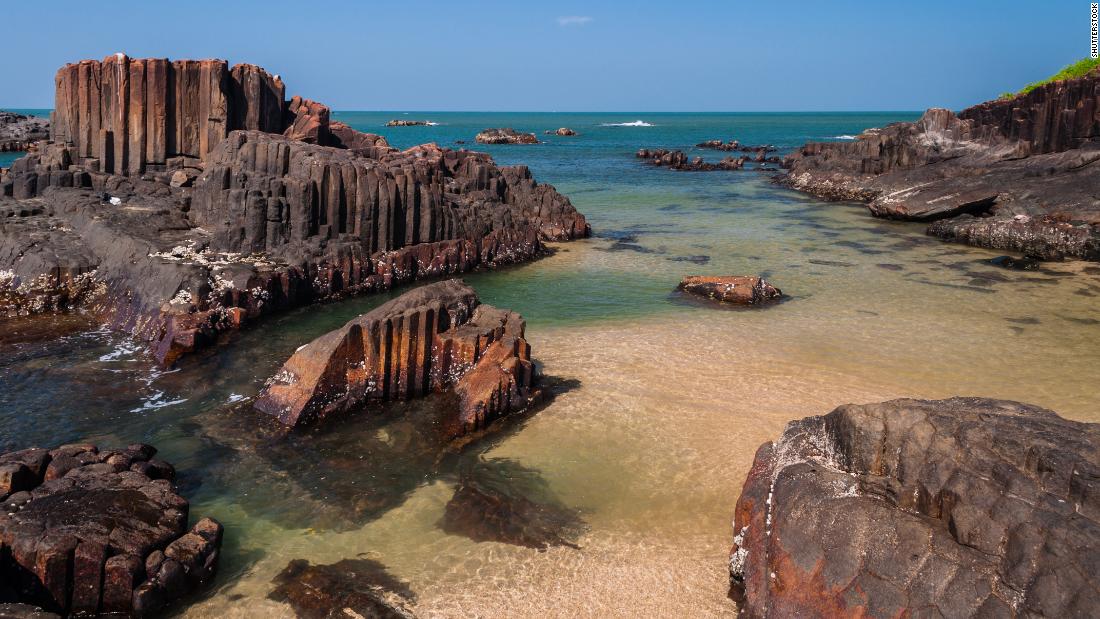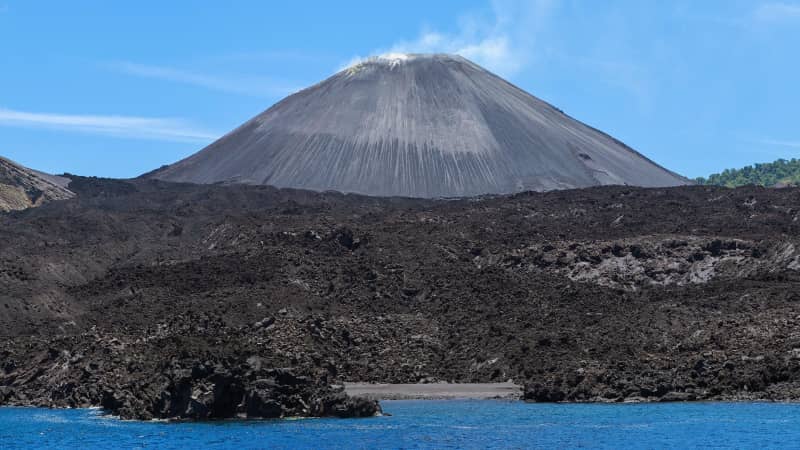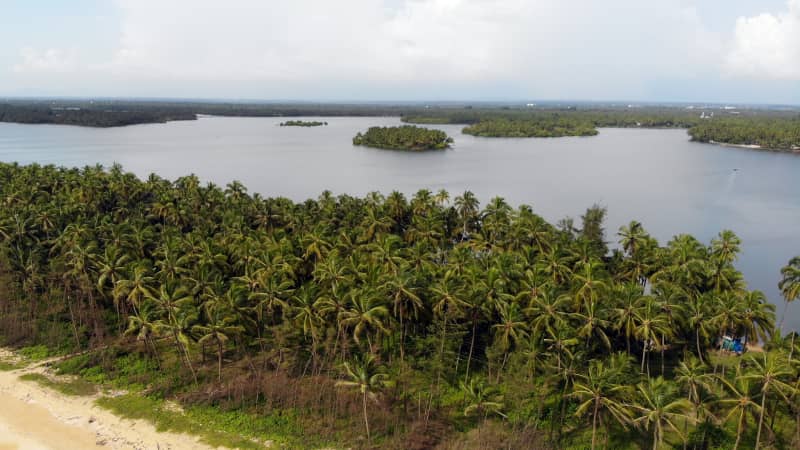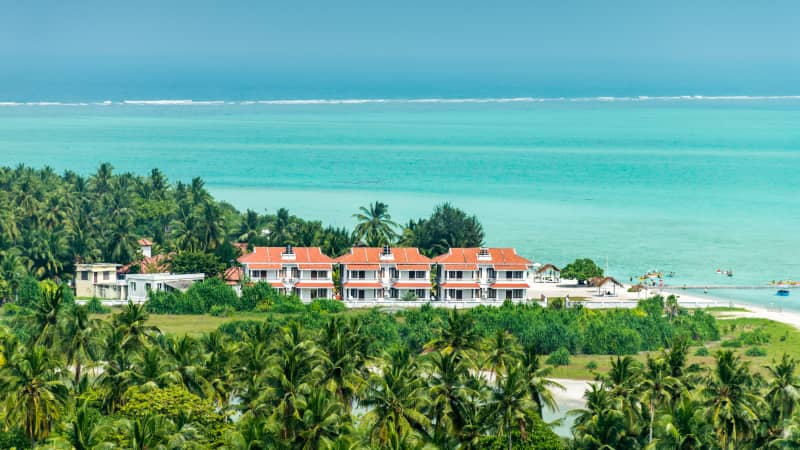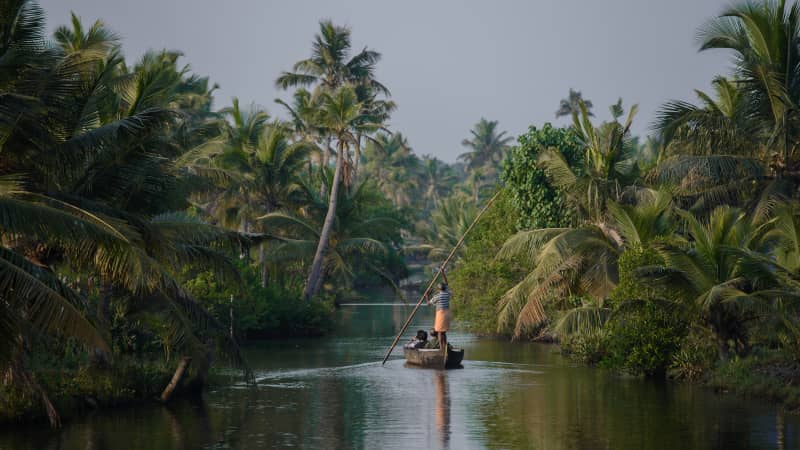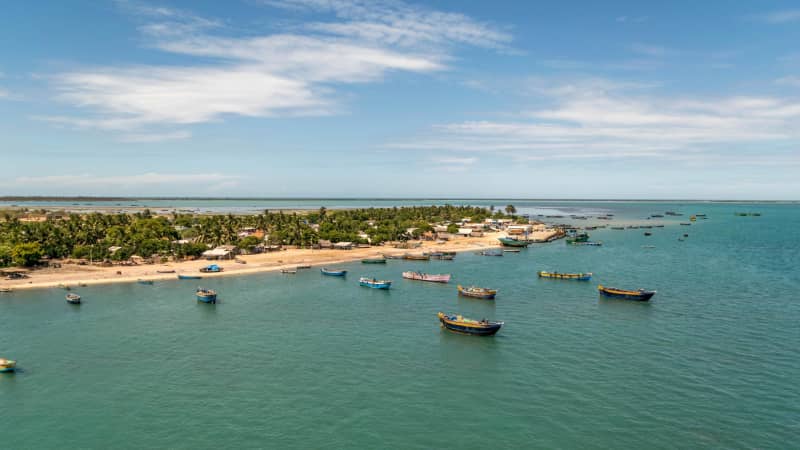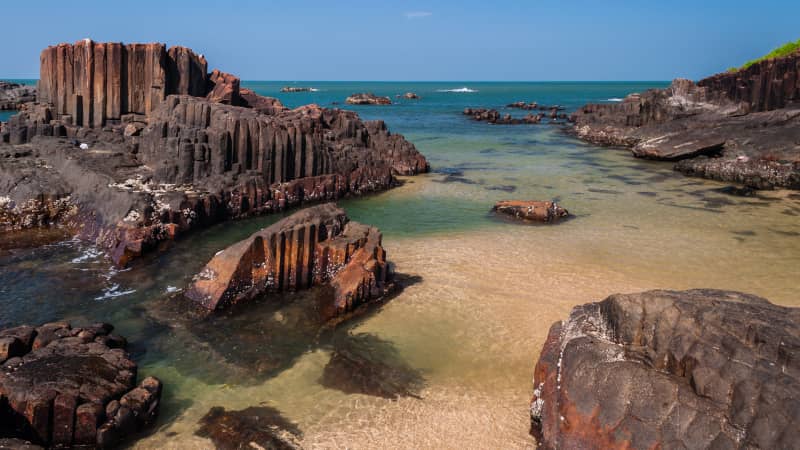You can easily spend a few weeks (or months) exploring the popular Golden Triangle circuit that covers Delhi, the Taj Mahal in Agra, and Jaipur in the Rajasthan desert; visiting the sacred cities of Varanasi and Haridwar in North India; tracing the colonial past in Kolkata, shopping in Mumbai or temple-hopping in South India.
India is also home to some 4,671 miles of beautiful coastline and more than a thousand islands.
Some offer a diverse menu of aquatic attractions, while others harbor superb cultural and natural treasures.
Here’s the lowdown on the 13 best islands in India.
Barren Island, Andaman
Exploring Barren Island — home to India’s only live volcano, which last erupted in 2017 — is a ballgame that’s a little different, given the fact it’s prohibited to set foot onshore.
Instead, all the fun and adventure takes place below the water surface.
The fluorescent blue waters surrounding the uninhabited island are a playground for scuba enthusiasts. They’re brimming with lava rock caverns, fields of hard and soft corals, and diverse marine life — think playful dolphins, manta rays, green sea turtles, sea snakes and reef fish.
The island is part of the Andaman and Nicobar archipelago and can be explored off a live-aboard ship, or via a boat from Swaraj Dweep or Port Blair.
Diu Island, Daman and Diu
Located on the west coast of India, Diu is like a mini Goa, minus the crowds and nightlife.
The island’s eleven miles of coastline are dotted with uncrowded sandy beaches and crystal-clear waters.
Jallandhar and Vanakbara beaches are best for sun-worshipping and people-watching, while travelers looking to indulge in water sports can head to Ghoghla and Nagoa. Parasailing, water skiing, snorkeling, scuba diving and banana boat rides are available here.
To the east of the island lies the namesake town that’s rife with churches and forts from the time of Portuguese rule. One of the most remarkable buildings is the 16th-century Diu Fortress overlooking the sea.
Divar Island, Goa
A short ferry ride away from mainland Goa, Divar Island — on the Mandovi River — feels like a trip through time.
The quiet narrow streets are dotted with old Portuguese-style houses that will keep the photography enthusiasts hooked, whilst the wooded hills and fields full of rice crops provide an authentic look at rural Goan life.
The island also has 16th-century churches and temples. Of particular note is the Catholic Church of Our Lady of Piety that stands on a hilltop, offering epic views of the Mandovi River.
There are a handful of no-frills eateries and a few homestays. You’ll mostly have this paradise for yourself.
Kavvayi, Kerala
Reachable via a short ferry ride from the town of Payyanur in the north Kerala region, Kavvayi is a string of tiny islets that affords calm of the highest quality.
The island has a pristine beach, facing the Arabian Sea, perfect for sun-worshipping, while those looking to soak up the rustic island life can take a boat trip along the languid backwaters running on the opposite side of the beach. Graceful palms are everywhere.
In the mood for some cultural exploration? Attend temple festivals and theyyam (a traditional dance) in Payyannur.
In the vicinity of the town lies the Mangrove Trail of Malabar that offers kayaking, hiking and bird-watching opportunities.
Rest up for the night at Kavvayi Beach House that gives guests an authentic Kerala experience, complete with Ayurvedic treatments — it’s India’s traditional natural healing system that has been practiced for thousands of years.
Majuli, Assam
Measuring 136 square miles, Majuli — an island on the River Brahmaputra in the northeast state of Assam — is considered to be the largest river island in India.
But floods and erosion in recent years is threatening its title and, in the long run, its future.
Nevertheless, it’s a great choice for travelers who want a respite from the frantic energy of the big cities.
Life here is largely rural, slow-paced and governed by Mother Nature, while villages with bamboo huts built on stilts lend the island a humble vibe.
Responsible travel here is key.
Travelers can rent a bicycle from Majuli Cycle Cafe, part of the Majuli Sustainable Tourism Development Project, and explore the island at their own pace past paddy fields and villages. Guided tours led by locals are also on offer.
Nature lovers can go birdwatching at Vereki Beel and Chakoli Beel — two main wetlands of the island, home to several native and migratory birds, including Siberian cranes, pheasant-tailed jacanas and pelicans — to name a few.
For visitors who are curious about island history and culture, visit the satras — Hindu Vaishnavite monasteries and centers of art.
At some of the monastic centers, craftsmen make religious masks of clay and bamboo, while at many others teachings, prayers and plays are held; Auniati Satra, Sri Sri Uttar Kamalabari Satra and Samaguri Satra are especially noteworthy.
The island can be reached only via a ferry from Nimati Ghat — about seven miles from the Assamese city of Jorhat.
Avoid monsoon season — July to September — as most of the isle is submerged.
Minicoy, Lakshadweep
One of the 36 islets of the Lakshadweep archipelago in the Laccadive Sea — about 249 miles off the Kerala coast — Minicoy is the perfect blend of relaxation and activity.
Located in the southernmost atoll — geographically closer to the Maldives than the rest of India — the island’s gin-clear waters are rich with marine life, pristine coral reefs and shipwrecks, delivering some of the best scuba diving and snorkeling in the country.
After exploring the underwater world, grab a sailboard or a kayak to explore the ocean.
Or roll out a towel on the powder-white sand and simply relax and enjoy the peace and privacy of this stunning island.
Take time to explore the quaint villages too.
If you want to get that postcard (or Instagrammable) shot, climb the namesake white lighthouse — built by the British in 1885– yielding an incredible view of the Arabian Sea.
Munroe Island, Kerala
In the southwestern state of Kerala, a cruise on the backwaters is popular. While most people head to the backwaters of Alleppey, the peaceful Munroe Island — near Kollam city — is equally as fascinating. You can think of it as a miniature of Alleppey in a more pristine, unspoiled state.
Known as Mundrothuruthu in the local Malayalam language, it’s actually a cluster of eight islets formed by Ashtamudi backwaters and Kallada River.
Visitors can hop aboard a canoe and snake through the palm-lined canals, past tiled-roof houses with little boats moored outside; and dozens of bird species that thrive in this ecosystem.
Birdwatchers may glimpse egrets, plovers, kingfishers, terns, woodpeckers and herons here.
A cycling or walking tour of the island to explore the coconut farms and spice plantations is highly recommended.
A serene sunset on the Ashtamudi Lake, as fishermen set out their boats for the day’s last catch, is the best way to end the day here.
The sleepy island gets festive during the annual snake-boat race called Kallada Jalotsavam. It’s held 28 days after the harvest festival of Onam in August or September.
There are a few resorts and homestays with basic facilities like the Munroe Island Backwaters Homestay.
Ferries run from Perumon Ferry Terminal — about eight miles from the port city of Kollam in southern Kerala to the island daily. Alternatively, you can reach via train or taxi from Kollam.
Netrani Island, Karnataka
Among avid scuba enthusiasts, Netrani Island — in southern Karnataka state — is well known for its marine diversity, but few tourists know it exists — and that’s what makes it so special.
Apart from vibrant coral reefs, a variety of sea life including sea urchins, sea cucumbers, turtles, stingrays and schools of parrot fish, trigger fish, butterfly fish, surgeonfish and puffers inject the cerulean waters of this heart-shaped island with colors you’d find in a bag of confetti.
If you’re lucky, you may even spot orca and whale sharks.
Artillery shells are also visible underwater, as the isle was once used by the Indian Navy for target practice.
It’s not possible to overnight on the island, but day trips are easy to arrange from Murudeshwar, a beachside pilgrimage town just eleven miles away.
Pamban Island, Tamil Nadu
Located in southern India, this island — off the coast of Tamil Nadu — is popular among devout Hindus who flock to its holy town of Rameswaram, best known for Ramanathaswamy temple. But this isn’t the only thing the island has to offer.
It’s got beautiful beaches and turquoise blue waters that offer a myriad of aquatic adventures.
Options include kayaking, diving, kitesurfing, stand-up paddleboarding, windsurfing and snorkeling.
A 30-minute drive away is Dhanushkodi — a township that was abandoned half a century ago because of a cyclone, but blessed with a picturesque seaside.
The approach to the island is part of the draw — it’s connected to the mainland via two bridges (one for trains and one for other vehicles) — both offer incredible views over the Gulf of Mannar.
Pequeno Island, Goa
Pequeno Island (aka Bat Island) is just a hop, skip and boat away from Baina beach in Mormugao, South Goa.
With largely untouched coral reefs, the main attractions of the island are snorkeling and diving. Expect to see brain coral, star coral, hawksbill turtles, sea urchins and shoals of colorful fish without many other boats around.
Poovar, Kerala
If your tastes run to fewer tourists, more nature, Poovar — a tiny island about an hour south of Thiruvananthapuram, Kerala — is the place to be.
Days can be spent cruising along its sun-loving backwaters in a country boat, lounging on a sandy beach, exploring the nearby villages, and appreciating an atmosphere that’s remained untainted by tourism.
Keep your eyes peeled for pied kingfisher, cormorants, brahminy kite and other species of birds while cruising.
St. Mary’s Island, Karnataka
Found near the port of Malpe in the southern state of Karnataka, St. Mary’s Island is a cluster of four tiny islets. Portuguese explorer Vasco da Gama is said to have landed on the isle in the late 15th century on his way to Kerala.
It has hexagonal basalt lava rock columns, clustered like a giant honeycomb and extending several yards into the sea, backed by miles of coconut palms.
When the sun sets, the sea and columns are suffused with the tones of orange and red across the Arabian Sea.
It is also a birders’ paradise full of seagulls, sandpipers, gray and white egrets, and dozens of other species.
The island has no hotels, shops or buildings to alter its pristine landscape, which means you need to bring your own supplies.
To get here, hop on a ferry from Malpe beach. It runs daily, except during monsoon season (June to mid-September). Be sure to keep track of the ferry timings as overnight camping is not permitted so you’ll need to catch the last ferry back to the mainland.
Swaraj Dweep, Andaman
Swaraj Dweep (formerly Havelock) — a short ferry ride from Andaman’s capital Port Blair — is one of India’s go-to tropical escapes.
Silky beaches, sky-blue waters, diverse coral reefs and rainforest trails are all found here in abundance.
Radhanagar (known locally as Beach No. 7) is the crown jewel. It holds a Blue Flag status in recognition of its cleanliness and clear waters. The sunsets steal the show here.
A couple of kilometers’ walk from Beach No.7 will lead you to Elephant Beach. Adrenaline seekers will be spoiled for choice here with a range of water sports on offer — snorkeling, jet skiing, banana boat rides, glass boat rides, undersea walking, and more.
The island offers a true treat for scuba divers as well. Dive sites like the Wall and White House Rock are ideal for all skill levels, while Johnny’s Gorge and Dixon’s Pinnacle are best suited for experienced divers.
Expect encounters with snappers, manta rays, reef sharks and a myriad of other fish species.
Out of the water, refuel with a seafood platter at Red Snapper, the restaurant at Wild Orchid Resort, before exploring the hidden waterfalls and island’s wooded interior on a cycle or scooter, easy to hire from most resorts or a local rental outfit.
